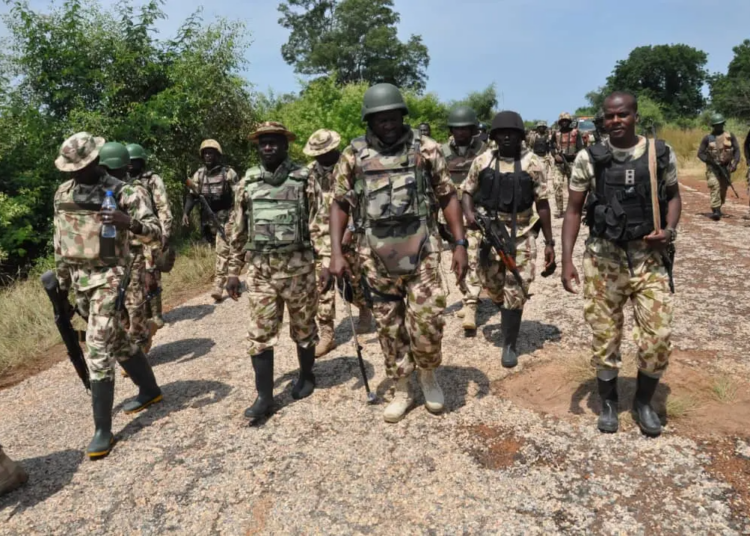We wrote this editorial recently as part of our unwillingness to accept an emerging pattern – the targeting of security operatives by non-state actors. With the killing of five soldiers in Abia state, we feel obliged to repeat it as a call to the military hierarchy to initiate a process of investigating why soldiers are becoming targets of killers. Only recently, two or so soldiers were mobbed by civilians in the Banex area of Abuja. This is reprehensible, and we ask why. The military high command owes itself and the nation a duty to provide the needed answer.
The news is nothing short of devastating. Gun-wielding non-state actors are reported to have killed a total of 154 military and police officers and men in the last year.
According to a finding by this newspaper, between March 2023 and March 2024, 90 policemen were killed, while 64 military personnel also lost their lives to the activities of outlaws.
In this newspaper’s opinion, this unacceptable situation cannot be allowed to continue. It is understood that men and women put on their uniforms and go out to face the dangers that threaten the collective. They do so knowing fully well that their own safety and well-being may be at risk. Notwithstanding, they make this sacrifice willingly, driven by a sense of duty and a commitment to serve the greater good.
But the sheer scale of their losses in the recent past is a stain on the nation’s conscience even as the country is not at war. This, in our view, is unacceptable.
It befuddles the mind to expect security agencies and their operatives to continue putting their lives on the line when the society they serve seems unable or unwilling to provide them with the support and protection they deserve.
The details of these attacks are nothing short of horrific. In one particular incident, a Divisional Police Officer named Bako Angbanshin was ambushed, killed, and then dismembered, his body parts hidden for months before being discovered.
We still have not forgotten the killing of 17 soldiers in Okuama community in Oghelli South Local Government Area of Delta State. Such senseless acts of brutality not only rob the nation of irreplaceable human lives, but they also strike at the very heart of her social fabric, instilling fear and undermining the public’s trust in the ability of the security forces to keep themselves safe.
And it is not just the dedicated law enforcement personnel who have borne the brunt of this violence. In Niger State, a group of brave civilian volunteers known as the Yan Sa Kai, who had joined forces with security operatives to combat the scourge of banditry, were also targeted, with 30 of their members killed in a single attack.
These individuals, motivated to protect their communities, have now paid the ultimate price for their courage and conviction.
The sheer scale of these losses is staggering, and it is clear that the security apparatus is struggling to keep pace with the evolving threats that the nation faces.
It is gratifying to note that Nigerian troops killed 2,351 outlaws in the first quarter of 2024 – that is, from January to March – in different operations across the country. The Director of Defence Media Operations, Major General Edward Buba, said this during a media briefing in Abuja to give an update about the military’s operations nationwide.
Needless to say, the political authorities owe themselves and the nation a duty to provide the security forces with the resources, training, and equipment they need to effectively combat the forces of lawlessness and violence that threaten the communities.
This means significantly increasing funding for the military and police, investing in advanced intelligence-gathering capabilities, and ensuring that frontline defenders have access to the latest technology and tactical gear to keep them safe as they carry out their duties.
But funding alone is not enough. We must also work to strengthen the bonds of trust between the security forces and the communities they serve.
Too often, the actions of a few rogue elements have tarnished the reputation of the many, leading to a breakdown in the crucial relationship between the public and those tasked with their protection.
Furthermore, the government must redouble efforts to address the root causes of the violence that plagues our nation. Poverty, inequality, and a lack of economic opportunity have all contributed to the rise of criminal gangs and insurgent groups, as desperate individuals turn to lawlessness in the absence of legitimate avenues for advancement. By investing in sustainable development initiatives, improving access to education and healthcare, and creating jobs and economic opportunities, the country can address these underlying issues and starve the forces of violence the conditions that allow them to thrive.
In the end, we, as a newspaper, insist that the safety and security of the nation must be of the highest priority. We cannot allow the sacrifices of our brave defenders to be in vain, nor can we afford to let the forces of lawlessness and chaos continue to erode the foundations of our society.
Let us honour the memory of those we have lost by redoubling our efforts to build a safer, more secure Nigeria – one where our protectors can carry out their duties without fear, and all citizens can live in peace and prosperity.
We’ve got the edge. Get real-time reports, breaking scoops, and exclusive angles delivered straight to your phone. Don’t settle for stale news. Join LEADERSHIP NEWS on WhatsApp for 24/7 updates →
Join Our WhatsApp Channel










